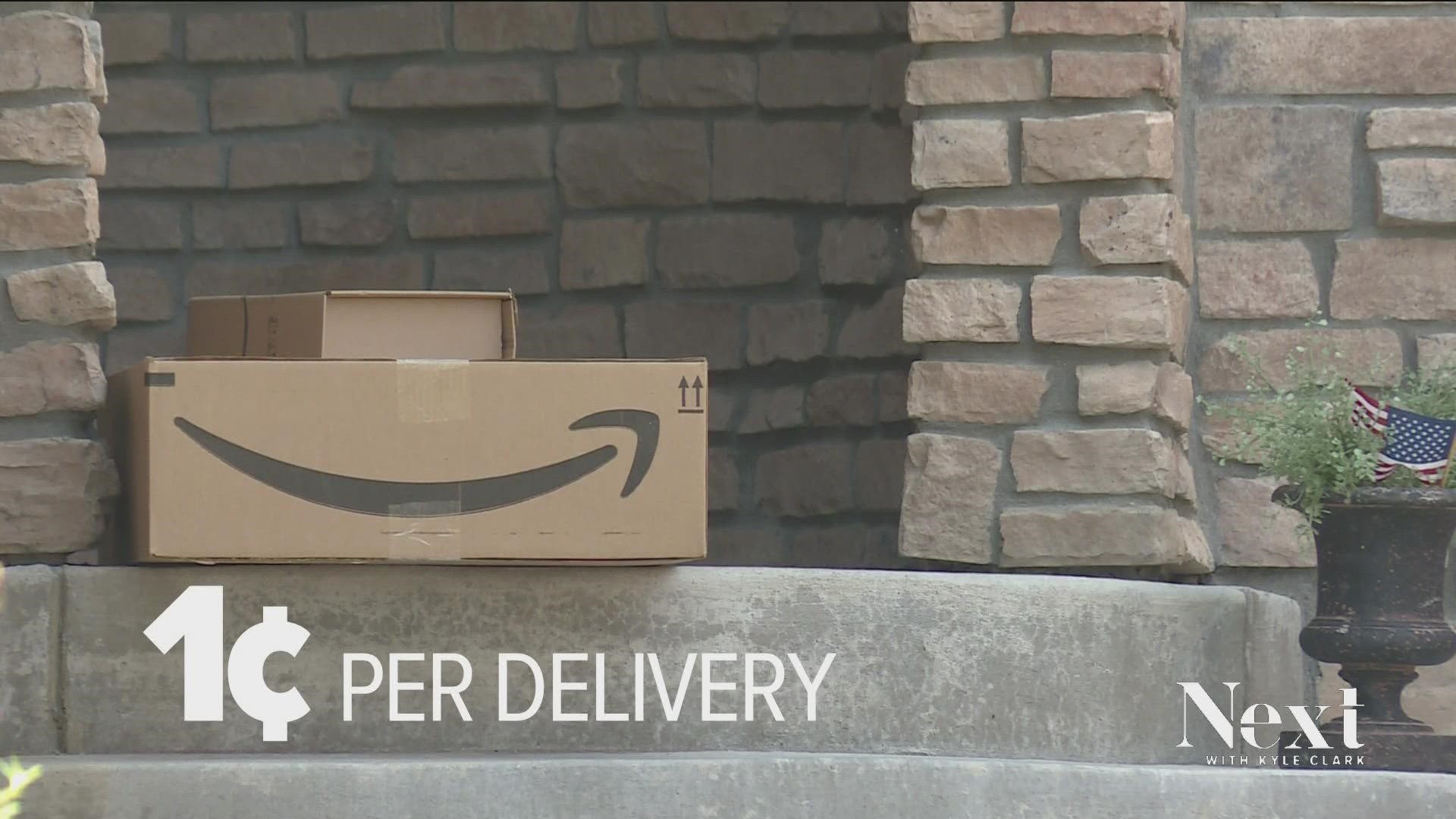DENVER — Colorado has a long history of debating whether or not a fee is a tax.
The Taxpayer Bill of Rights (TABOR) requires voters to approve every new tax increase.
Lawmakers came up with fees that do not need your approval.
Like the month-old 27-cent delivery fee.
It turns out that fee also gets taxed.
And it is not the only one.
"We have found a couple of other fees," said Aurora City Councilman Dustin Zvonek.
Zvonek first brought up the discovery that the delivery fee is added into the total purchase price before tax is calculated. That means the fee gets taxed.
"I don't think that this tax on a fee is defensible. You're not taxing a service, you're not taxing a product, you're taxing a government fee," said Zvonek.
And he found out that the city has one other fee, and an upcoming fee, that could be taxed as well.
"There's another fee that we pay for waste tires. So, when you get a new set of tires, you pay a fee for, basically, recycling your old tire. That fee is subject to sales tax," said Zvonek. "The tax on the waste tire fee is about $10,000 a year."
He has a proposal in front of Aurora city council's study session on Monday night that would exempt government fees from the city sales tax.
The city of Denver has a similar proposal, but only to exempt the delivery fee and bag fee from being taxed.
"We want to respect the intent of that [bag] fee, but we recognize that taxing the fee is not part of the intention," said Denver Department of Finance Communications Director Kiki Turner.
Denver's bag fee, which went into effect in July 2021, charges 10 cents for a paper or plastic bag. Of that, four cents stay with the retailer and the other six cents goes back to the city.
Denver sold 28 million bags in the last year. For every six cents that Denver gets, that totaled $1.7 million. The city does not know if every retailer taxed the fee, but if they did, that would have brought in an extra $81,000 to the general fund.
"It also was looping in the fee into the total purchase price which was being taxed," said Turner.
She said that based on the math, the city believes that for every bag purchased, a customer is paying an extra half cent, and for every delivery, the consumer is paying an extra penny.
Denver's proposal to change the tax policy has its first hearing on Tuesday and will take at least three weeks to go through city council.
Self-collecting home rule municipalities are the areas that might be taxing the fees. These are cities and towns that collect their own city sales taxes.
Here are the 69 self-collecting home rule municipalities:
1. Arvada
2. Aspen
3. Aurora
4. Avon
5. Black Hawk
6. Boulder
7. Breckenridge
8. Brighton
9. Broomfield
10. Carbondale
11. Castle Rock
12. Castle Pines
13. Centennial
14. Central City
15. Cherry Hills Village
16. Colorado Springs
17. Commerce City
18. Cortez
19. Craig
20. Crested Butte
21. Dacono
22. Delta
23. Denver
24. Durango
25. Edgewater
26. Englewood
27. Evans
28. Federal Heights
29. Fort Collins
30. Frisco
31. Glendale
32. Glenwood Springs
33. Golden
34. Grand Junction
35. Greeley
36. Greenwood Village
37. Gunnison
38. Gypsum
39. Lafayette
40. La Junta
41. Lakewood
42. Lamar
43. Littleton
44. Lone Tree
45. Longmont
46. Louisville
47. Loveland
48. Montrose
49. Mountain Village
50. Mt. Crested Butte
51. Northglenn
52. Parker
53. Pueblo
54. Ridgway
55. Rifle
56. Sheridan
57. Silverthorne
58. Snowmass Village
59. Steamboat Springs
60. Sterling
61. Telluride
62. Thornton
63. Timnath
64. Vail
65. Westminster
66. Wheat Ridge
67. Windsor
68. Winter Park
69. Woodland Park
SUGGESTED VIDEOS: Full Episodes of Next with Kyle Clark

